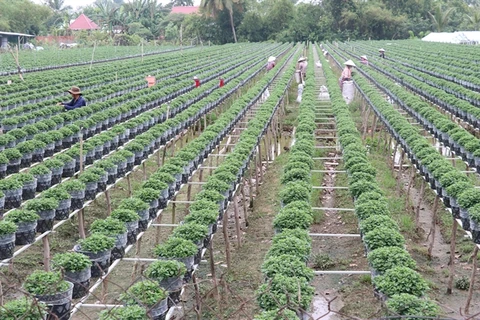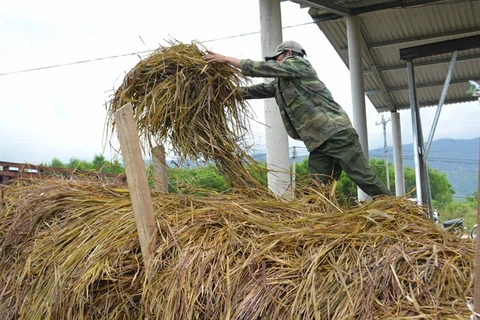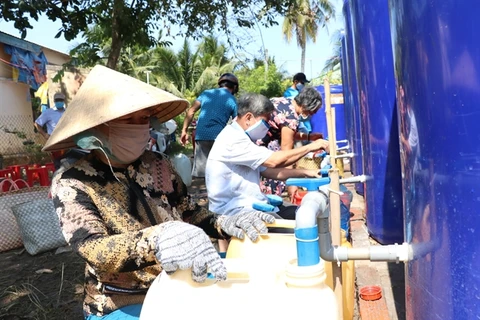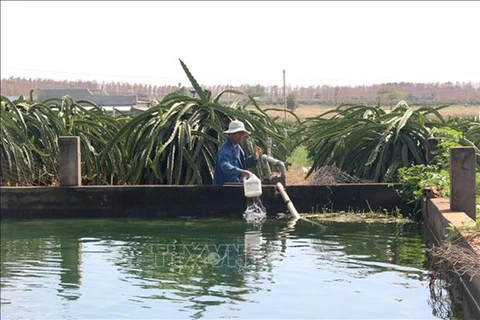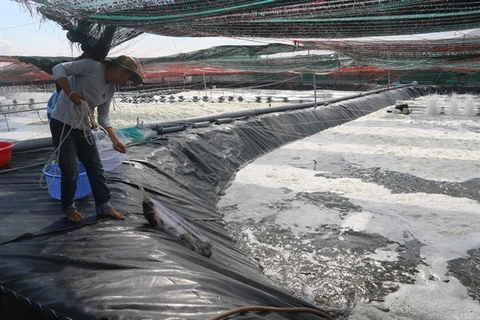 Farmers row a boat to the English speaking class every Tuesday and Thursday afternoon. (Photo: tienphong.vn)
Farmers row a boat to the English speaking class every Tuesday and Thursday afternoon. (Photo: tienphong.vn) Can Tho (VNS/VNA) - There is a special class on Son Islet in the Mekong Delta city of Can Tho’s Binh Thuy district, which all farmers from the local area can attend to learn English for free on Tuesday and Thursday afternoon.
The students range in age from eight to 60 years old at the class on the fish farm raft of Ly Van Bon in the district’s Bui Huu Nghia ward.
Bon said there were 30 students in the class, but the number of attendees could increase.
Many of them are people from the same family who live tough lives, mostly fruit and vegetable and fish farming.
As well as pens and notebooks, they bring some of the fruit and veg they have grown to the class to give to their teachers.
“Attending the class, people will be taught how to speak about houses, gardens, river and related issues in the Islet,” Bon was quoted by Tien phong (Vanguard) newspaper as saying.
He wanted to learn English to introduce foreign visitors to fish rafts, the fish’s characteristics and how to take care of them, Bon said.
According to Bon, the students enjoy the lessons and his class is always full of laughter and the sounds of passionate learning.
Sixty-year-old Tam Loan, a shipper, said in the beginning she found it difficult to spell English words. However, with the support of a teacher, she can now spell her name correctly.
“Now I’m happy as I can speak a little bit of English despite the fact that I still feel stiff and embarrassed,” she said.
“In the past, I couldn’t speak any English words. I was busy carrying food from house to house. Whenever I met a foreigner, I only smiled and shook hands with them."
Hien, another local resident, comes to class with her eight-year-old daughter.
“When I rowed a boat for foreign tourists, I could only say ‘Hello’ and then raise my hand up. I couldn’t say anything and had to let the tour guide speak,” she said.
Taking about the students, Ta Minh Khoi, who runs the class, said despite the age difference and their busy working lives, all the students are enthusiastic to learn.
“We expect that through this class, local residents can basically introduce the culture and products to visitors, contributing to the development of Son Islet in particular and the city in general,” he said.
Khoi said the class was expected to finish in two months. However, it could be extended if people have a strong desire to keep going.
With an area of about 70ha, Sơn Islet is home to nearly 100 households.
The islet used to be a poor area with low infrastructure and living standards. Now it has been praised for its eco-tourism development.
Local people have learned how to preserve and take advantage of nature whilst boosting tourism to create greater profits.
Arriving at the islet, tourists can choose to visit only a few places to explore cake-making, watch flying fish and pomelo gardens, and rowing boats. They can also walk around countryside roads to experience the culture and lifestyle of local people.
Tourists can also visit floating fish-raft villages, orchards, and stork gardens, and learn to make traditional cakes and cook local dishes./.
VNA
